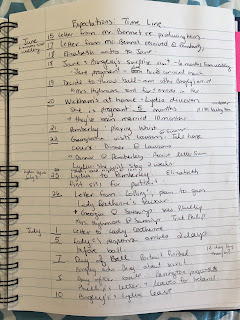I am a huge believer in letting my work rest. I can’t see my work clearly for a few weeks after each draft. Now is not the time to let others read the whole thing. I might share a few chapters here and there. I find reading them aloud to trusted listeners very helpful. I also like to write a few short stories, blog posts, or even to start a new novel while I wait for the first draft to rest. If problems or ideas for revision pop up while I wait, I jot them down for later – in a notebook or as a note on my novel. These ideas can wait. Here is an example from my book Taking Comfort.
After the wait, I reread the whole novel slowly. I do a
quick edit – spelling, extra words, wrong words, mistakes, anything that stands
out. I also make notes, either directly on the manuscript or in my notebook,
about things that need developing, or storylines I drop later. I know I will
need to do another revision. I find it overwhelming to attempt these revisions
the first time through. Again, it helps to let these ideas simmer, like a stew
gathering flavour for hours on the stove. After the second draft, I wait
another few weeks.
I have also created Timelines for my books as I edit. This helps me keep track of months, seasons and years. Here is an example from my book Expectations:
In my first novels, I found feedback difficult – embarrassed
by my weaknesses. I don’t find this anymore, but don’t be surprised if it
happens to you. Give it a few days. Then, you should be ready to accept the
suggestions with more perspective. You may also find you need to use different
readers for your next novel.
On the fourth draft, I don’t read the whole novel again. Instead,
I go through and fix whatever my readers have noted. I really love it when they
use Track Changes and I can go through and read their comments or simply accept
changes made.
At this point, I usually start sending my novel out to
agents and publishers. I’ve received some excellent tips this way. If I could
afford it, I would send my book to an editor instead. Maybe one day.
I recently received some excellent tips from Leanne Morgena,
Senior Editor at The Wild Rose Press. Thank you, Leanne! Here are some of the
tips I am currently using to improve my books:
·
Search for passive phrases “it was, it is, it’s,
there’s, there was” etc.
·
Don’t paraphrase dialogue
· Look for times when I say “felt, heard, noticed, thought” Usually, these sentences should be rewritten to show rather than tell
I use these tips to go through my novel in detail. After this point, I can’t do much else alone. I send it out. I hope for the best!
Next week, I will share what I’ve learned about seeking a Publisher or Agent.




No comments:
Post a Comment